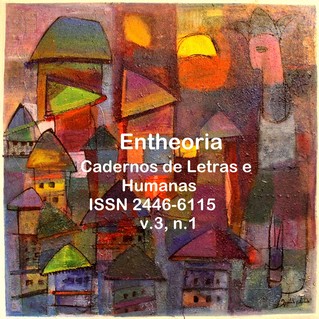AFRO-AMERICAN CULTURAL AND ARTISTIC ALTERITIES: NICOLÁS GUILLÉN, SOLANO TRINDADE AND NICOMEDES SANTA CRUZ
Keywords:
Oralidade, Escritura, Alteridades artísticas e culturaisAbstract
One of the convergence trends among Afrodescendant writings produced in the Americas during the 20th century was the recurrence of orality and identity consciousness as structuring elements of poetic and narrative discourses. Interference of this order makes us think of Latin American writers of African descent such as Nicomedes Santa Cruz, Peruvian, Nicolás Guillén, Cuban, and Solano Trindade, Brazilian. In the work of these authors, the relationship between orality and writing seems to be drawn from similar sources, ranging from the oral tradition of the Amerindian peoples and from the old African cries to the mnemonic resources used by accountants and storytellers and their oral narratives in performance situations, counting with popular sayings, jokes and riddles, as well as with the work of rural and urban singers of Iberian tradition, which can be found in Peru (décimas, yaravíes), Cuba (contrapunteos, guajiras) or in the Northeast of Brazil (cantorias de viola, emboladas). This text is based on a critical reflection that includes studies by Ojeda, Orihuela, Glissant, Retamar, Bernd, Santiago and Zumthor and outlines some questions related to the Afro-American alterities expressed in the artistic discourse of the aforementioned poets.Downloads
References
BERND, Z. Poesia negra brasileira e seus vínculos com a poesia de Nicolás Guillén (1997). Disponível em: http://www.conex.com.br/user/zilab/#ponegra
_____; DE GRANDIS, R. (Orgs). Imprevisíveis Américas: questões de hibridação cultural nas Américas. Porto Alegre: Sagra/Luzzatto/ABECAN, 1995, pp.177-187.
FUENTES, C. Situación del escritor en América Latina. (Conversa con Emir Rodríguez Monegal). Paris: Mundo Nuevo, n.1, 1966.
GLISSANT, E. Introduction à une poétique du divers. Montréal: Presses de l'Université de Montréal,1995.
_____. Poétique de la relation. Paris: Gallimard, 1990.
GUILLÉN, N. Summa poética. Madrid: Catedra, 1990.
_____. Sôngoro cosongo e outros poemas. Tradução de Thiago de Mello. Rio de Janeiro: Philobiblion, 1986.
MEDEIROS, T. Fragmento de “Um socopé para Nicolas Guillén”. In: DÁSKALOS, M. A.; BARBEITOS, A.; APA, L. (Orgs). Poesia africana de língua portuguesa (Antologia). Rio de Janeiro: Lacerda Editores, 2003.
OJEDA, M. Nicomedes Santacruz, poeta peruano – Prólogo 17 a Canto Negro. Disponível em: http://www.andes.missouri.edu/andes/Ciberayllu.html.
ORIHUELA, C. La poética de Nicomedes Santa Cruz y su desafío al canon de la literatura hegemónica peruana. Disponível em: http://es.geocities.com/nicomedessantacruz/orihuela.htm
QUEIROZ, A. O. América hispânica, América portuguesa, AfroAmérica-latina: aproximações culturais pela poesia. In: Anais do Jalla Brasil 2010 - Jornadas Andinas de Literatura Latino-americana: América Latina, integração e interlocução. Niterói: UFF, 2010. v. 1. pp. 92-96.
RAMOS DA SILVA, L. Consciência negra e americanidade: o diálogo identitário de Nicolás Guillén e Solano Trindade. In: BERND, Z. (Org). Americanidade e transferências culturais. Porto Alegre: Movimento, 2003, Coleção Ensaios, vol. 54, pp. 150-165.
RETAMAR, R. F. América Latina y el trasfondo de Occidente. in: ZEA, L. América Latina en sus ideas. México - DF: Siglo XXI, 1993, p.300.
RODRÍGUEZ, J. C.; S., Á. Introducción al Estudio de la Literatura Hispanoamericana. Madrid: Akal, 1994, 2a edición, pp.14-18.
SANTA CRUZ, N. Décimas y poesías. Lima: 1971.
SANTIAGO, S. O entre-lugar do discurso latino-americano. In: Uma literatura nos trópicos. São Paulo: Perspectiva, 1978, pp.11-28.
TRINDADE, S. Cantares ao meu povo. São Paulo: Fulgor, 1961.
ZUMTHOR, P. Performance, recepção, leitura. Trad. Jerusa Pires Ferreira. São Paulo: Educ, 2000.
Downloads
Published
How to Cite
Issue
Section
License
O(s) Autor (es), na qualidade de titular (es) do direito de autor do ensaio ou artigo submetido à publicação, de acordo com a Lei nº. 9610/98, concorda (m) em ceder os direitos de publicação à Revista Entheoria e autoriza(m) que seja divulgado gratuitamente, sem ressarcimento dos direitos autorais, por meio do Portal de Revistas Eletrônicas da UFRPE e sites associados, para fins de leitura, impressão e/ou download pela Internet, a partir da data da aceitação do artigo pelo Conselho Editorial da Revista. É vedada a submissão integral ou parcial do manuscrito a qualquer outro periódico.


























